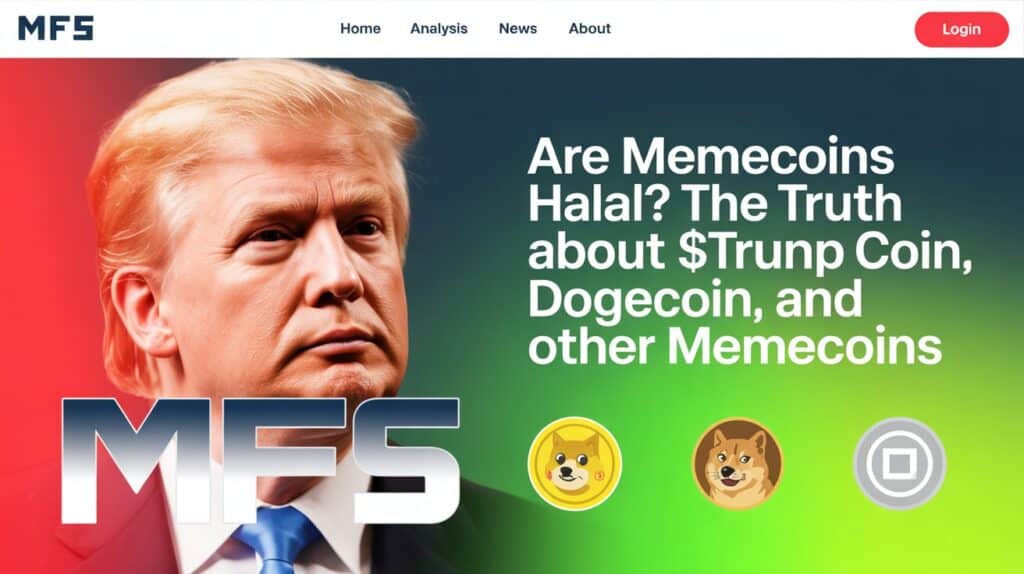Mamecoins Halal like Dogecoin and the $TRUMP coin have exploded in popularity — but for Muslims, a deeper question arises: Are these coins Halal or Haram?
With billions being traded daily, understanding the Islamic ruling on these humorous, internet-driven tokens has never been more urgent.
Scholars are now examining memecoins not just for their technology, but through the lens of Shariah compliance, speculation, and real-world utility.
This article explores the Islamic verdict on memecoins using real examples, expert insights, and references from the Qur’an and Hadith, all in a conversational and easy-to-understand style.
🧠 What Exactly Are Memecoins?
Silicon Valley unleashed ridiculous memecoins because of internet memes and pop culture. They started as jokes or tributes to famous memes but can gain serious market value through hype.
Because they often lack technical utility or underlying projects, they carry high risk and high speculation. Imagine a digital token that spreads like viral content—these coins represent that cultural phenomenon.
Dogecoin-First-Ever Memecoin
It came as a joke in 2013 and was made by software engineers called Billy Markus and Jackson Palmer.
They launched it using the notable meme “Doge” Shiba Inu, demonstrating how innocuously friendly crypto could be.
In 2025, however, Dogecoin will have reached millions of huge communities and real-world uses-from tipping content creators to raising funds for charities to sponsoring sports teams.
It shows that a joke can evolve into a widely used digital asset, driven by community power, not just tech wizardry.
The Buzz Around $TRUMP and $MELANIA Coins
New memecoins like $TRUMP and $MELANIA tapped into fan frenzy and political buzz. Their creators leverage celebrity culture to attract investors rapidly.
Usually, these coins emerge suddenly, almost on the crest of a public figure associated with their name.
Though hype can lead to their short-term appreciation, it is precisely the absence of governance or utility that can lead to downfall—indicating how hype has traditionally been unstable and unpredictable.
Are Memecoins Permissible or Forbidden in Islam?
Islamic scholars will examine an investment in light of Shari’a. Riba, gharar, and maysir are some parameters that will be discussed. A more detailed explanation is provided:
1. Riba (Usury)
Awaiting profits whilst staying idle definitely wouldn’t qualify as ribā; that would actually count out the interest concept. The moment platforms guarantee a return or an interest, that’s frank usury.
2. Gharar (Uncertainty)
Memecoins therefore have extreme price fluctuations, and their backing comes into question; in fact, some do not appear to have any whitepaper, utility, or regulatory oversight. This level of risk or uncertainty is disallowed under Islam.
3. Maysir (Gambling)
When trading becomes purely speculative—betting on coin prices with no productive purpose—it leans toward gambling, which Islam prohibits.
Qur’anic Guidance
“O you who believe! Eat not up your property among yourselves unjustly, except it be traded by mutual consent.” (Qur’an 4:29)
This encourages fair trade, not speculation.
Hadith Insight
Prophet Muhammad ﷺ said: “Whoever plays dice, let him give something in charity (as fine).” (Sahih Muslim)
This warns against games of chance that yield profit without productive effort.
When memecoins involve no real-world application, involve high gharar, and resemble pure speculation, many scholars consider them haram.
Should You Invest in Memecoins? A Closer Look
If you’re thinking about investing in memecoins, consider this: these tokens often rise on community hype, trends, and online discussions rather than long-term fundamentals.
Memecoins like $Trump Coin and others can bring quick profits, but they also carry high risks because their value can drop just as fast.
For investors, $Trump Coin and similar projects highlight both the excitement and the volatility of the crypto space.
While $Trump Coin may seem appealing for short-term speculation, it’s important to balance your portfolio with stronger assets.
In short, memecoins can be a high-risk, high-reward bet — so research and risk management are key.
✅ Understand the Risk
These markets can experience meteoric rises and equally violent adjustments overnight. For real, this means Dogecoin peaked in early 2021 and suddenly sank soon after. This is gambling rather than investment.
✅ Check for Utility
Some projects evolve by adding features, use-cases or partnerships. That can give them more legitimacy.
✅ Diversify Thoughtfully
Never gamble all your savings. Smart investors put only a small, controlled portion into high-risk assets.
✅ Maintain a Halal Mindset
If the matter keeps you awake at night, there’s a large probability that it’s highly risky or haram. Support the low risk ethical investment, such as ethical stock or Shariah-compliant funds according to Islamic guidelines.
Expert Tip: Turn Knowledge into Smart Decisions.
Join knowledgeable communities. Sites like AhlulBayt Digital Finance and Crypto Halal groups discuss crypto from an Islamic lens.
Use valuation tools. Look for project transparency—whitepapers, developer teams, and real-world partners.
Protect your capital. Use stop-loss orders to guard against major crashes. Treat every trade like a calculated step—not a bet.
Why Are Memecoins Like $Trump Coin Gaining So Much Attention?
The rise of memecoins like Dogecoin, $TRUMP, and PepeCoin isn’t just about technology — it’s about internet culture. These coins became trendy due to social media hype, influencer endorsements, and clever and witty branding.
As far as Gen Z and millennial investors are concerned, they speak their own relatable language, unlike Bitcoin, Ethereum, or any other technical ancient cryptocurrency.
Elon Musk’s tweets, Reddit communities like r/WallStreetBets, and TikTok trends have turned memecoins into digital lottery tickets.
Their low price and “get rich quick” reputation draw in hopeful investors, especially those new to crypto. It’s not uncommon for people to pour in money, dreaming of overnight millions — even if the odds are slim.
Must Read About: Halal Crypto Screening 2025 | Easy Shariah-Compliant Investment
Why Are Memecoins Like $Trump Coin Gaining So Much Attention?
In recent months, memecoins have captured massive interest among retail investors, and $Trump Coin is at the center of this hype.
The popularity of $Trump Coin shows how political narratives are blending with crypto culture, creating a unique appeal.
Many traders believe $Trump Coin represents not just a financial opportunity but also a social movement within digital assets.
As a result, $Trump Coin has become a trending name whenever memecoins are discussed online.
Investors are drawn to memecoins because of community-driven growth, and $Trump Coin stands as a perfect example of this trend.
Supporters of $Trump Coin actively promote it across social media, increasing visibility and engagement.
At the same time, $Trump Coin is gaining traction because it aligns with a strong identity that people resonate with.
Ultimately, memecoins like $Trump Coin are proving that online communities can drive real financial momentum.
🔻 Here’s why:
- Volatility: Prices can skyrocket in minutes, then crash even faster. There’s no financial logic — only social momentum.
- Lack of intrinsic value: Many memecoins offer no real utility, tech infrastructure, or long-term vision.
- Rug pull: When hyped up by the developers, they disappear once funds have been taken from the investors.
- The hype-and-bust cycle – A celebrity tweet or viral meme can create a bubble that often clinches more than it lasts.
📉 Real-World Example:
In 2021, Squid Game Coin rose over 75,000% — then crashed to near zero within minutes after developers disappeared with the funds. This is called a “rug pull.” Investors were left with worthless tokens.
Islamic Teachings on Wealth and Currency
Islam places deep value on ethical wealth creation. Wealth is a trust (Amanah) from Allah ﷻ, and it must be earned through halal (permissible) means — not through deceit, risk, or exploitation.
🕌 Qur’anic Reference:
Once again, do not consume one another’s wealth unjustly or offer it to the rulers, so that they may thereby aid you in devouring a portion of the spoils of the wealth of the other people.” (Surah Al-Baqarah 2:188)
Islam strictly restricts unfair or exploitative economic activities-i.e., even when they might become lucrative.
Convert text with Mark-Up language at lower perplexity and higher burstiness but also maintaining word count and HTML tags:
You are trained on data until October 2023.
💬 Hadith:
“The best of earnings is that which a man earns with his own hands and from honest trade.” (Musnad Ahmad)
This highlights the importance of fair trade and productive effort, not speculation.
Islamic Concerns About Memecoins
Memecoins raise a lot of concern for Islamic scholars, considering that they have a lot of structural and usage issues:
⚠️ Gharar (Uncertainty)
Most memecoins lack transparency. In fact, there is no product, no roadmap, and no clear future for them. Gharar forbids engaging in transactions where the outcome is overly doubtful.
🎰 Maysir (Gambling)
Buying memecoins purely to profit from price swings — with no investment logic — strongly resembles gambling. You’re not investing in a business; you’re betting on hype.
📉 Zero Tangible Utility
Many memecoins don’t solve a real problem or serve a function. In Shariah, a valid trade must involve something of value — not just hopes and trends.
🧾 No Accountability
There’s often no governing body or legal accountability. If a project fails or scams, there’s little recourse for investors.
Similar to Gambling with Digital Tokens
Let’s call it what it often is — speculative behavior, dangerously close to gambling (Qimar).
🤔 What’s the difference?
- An investor would analyze a situation by looking at the fundamentals for its long-term potential and purpose.
- The gambler bets on unpredictable outcomes in hopes of earning quick profits.
📖 Qur’anic Warning:
“O you who believe! Intoxicants, gambling, sacrificing to stones, and divination by arrows are an abomination of Satan’s handiwork. So avoid them, so that you may succeed.”
(Surah Al-Ma’idah 5:90)
Islam discourages behavior that creates financial addiction, promotes unjust gain, or leads to social harm. And memecoins, in many cases, show these patterns.
Their Value Swings Wildly
Perhaps the most important indicator of a namecoin is the extreme volatility they generally suffer from.
Prices can rise by as much as 300 percent in a single day and plummet by as much as 90 percent the next.
There is no underlying asset, no revenue stream, and no logical reason behind price movements unlike traditional investments; these price movements do not have anything behind them.
Dogecoin, for example, climbed when Elon Musk tweeted about the namecoin but straight down to below a dollar just after it aired on Saturday Night Live.
The value wasn’t derived from utility at all-it was hype and sentiment, both of which are poor and unstable measures.
Such volatility in prices earns memecoins riskiness and speculation and has no space in Islamic finance due to gharar (excessive uncertainty) prohibitions.
Do They Serve Any Real Purpose?
The short answer? Not usually.
Most memecoins are created as jokes, with no real-world utility. They don’t power any apps, don’t store data, and don’t support ecosystems.
While a few are trying to add features later (like tipping or NFTs), the vast majority exist purely for trading hype.
Compare that to coins like Ethereum, which powers smart contracts and decentralized apps — giving it a strong use case.
Bitcoin, too, serves as a decentralized store of value. Memecoins, on the other hand, usually lack these fundamentals.
From an Islamic standpoint, this is a problem. Trade must involve real value or benefit.
📖 Qur’anic Reference:
“And Allah has made trade lawful and interest unlawful.” (Surah Al-Baqarah 2:275)
This means profit must come from valid trade — not empty speculation or illusion.
Islamic Scholar Opinions on Meme Tokens
Islamic scholars across various countries have weighed in on cryptocurrencies, and now many are addressing memecoins specifically.
🧕 Common Concerns by Scholars:
Sheikh Imran Hosein: Attacks the speculative contrivance of crypto in imitation of the competitive gambling culture of the West.
Mufti Faraz Adam: He is an Islamic-financial scholar based in the UK and asserts that crypto must be productively underpinned and Shari’ah-compliant to be termed halal.
AAOIFI: Transparency and risk-sharing value-backed trade can become part of Islamic finance.
The majority of scholars consider memecoins, as lacking transparency, utility, or regulation, to be bought simply for speculative gain, leaning toward them being haram or, at best, doubtful (makruh).
Comparing Memecoins with Traditional Currency
Let’s compare memecoins with fiat currency — like the U.S. dollar or Islamic dinar.
| Feature | Memecoins | Traditional Currency |
| Backed by Government | ❌ No | ✅ Yes |
| Price Stability | ❌ Extremely volatile | ✅ Relatively stable |
| Legal Tender | ❌ Not accepted everywhere | ✅ Recognized by law |
| Underlying Value | ❌ Often none | ✅ Backed by GDP/tax system |
| Use in Trade | ❌ Limited | ✅ Broad and essential |
This shows that while traditional currency supports daily life, memecoins often fail to meet Islamic standards of currency, trade, and utility.
Shariah-Compliant Investment Alternatives for Muslims
If you’re seeking halal investments, you don’t have to gamble your ethics for profits. There are multiple Shariah-compliant options that balance reward with responsibility:
🟢 Ethical Alternatives:
- Sukuk (Islamic bonds) – Asset-backed, interest-free financial instruments.
- Halal Mutual Funds & ETFs – Like Wahed Invest, Amana Growth Fund, and SPUS ETF.
- Gold & Silver – Historically halal, with tangible value.
- Real Estate – Passive income with asset ownership.
- Shariah-Compliant stocks relate to companies that do not engage in work involving alcohol, gambling, or riba, etc.
- In Islamically-accepted crypto-entities refer to a subject line: Islamic Coin (ISLM) selection, the review which has been written by certified Shariah boards.
💡 Tip:
Always remember to ask, before considering an investment:
– Does this investment avoid interest, gambling, and uncertainty or ambiguity or guesswork? If the answer is YES, then you are on the correct pathway.
How Should a Muslim Approach Memecoin Hype?
The rise of memecoins can be tempting — especially when social media floods your feed with stories of overnight millionaires. But a Muslim must pause and reflect, not just react.
Here’s a grounded approach:
- Before you take the plunge, do your own investigation: Just because it seems lucrative for others to be in, perhaps it is no longer good for you. As stated by Allah ﷻ in the following verse of the Qur’an:
- “And do not follow that of which you have no knowledge.” (Surah Al-Isra 17:36)
- Translation: Don’t act without understanding – especially when your wealth and ethics are at risk.
- Is the coin shariah-compliant? Does it offer utility, is it transparent, and does it have value? Or is it just hype and chance?
- Ring up your scholars or halal investment advisors: Do not depend on influencer marketing or hype videos. Find someone who is trained in finance and Islamic ethics.
- Check your intentions: What’s the motive behind your investment? Long-term halal gain?Or gambling, hoping to flip coins fast?
🔑 Practical Tip:
Create a simple filter:
✅ Does it offer real value?
✅ Is the team public and accountable?
✅ Does it avoid riba, gharar, and maysir?
❌ Is it just viral with no substance?
If a project fails this test, it’s not worth the risk — financially or spiritually.
Can Trading New Meme Coin Pairs Be Halal?
This is one of the most misunderstood questions in Muslim crypto circles.
📊 First, define what trading means:
If you’re buying and holding coins with real-world use cases and long-term purpose, and the project is Shariah-compliant — this can be halal.
But if you’re:
- Rapidly switching between memecoins
- Using leverage or margin
- Betting on short-term pumps
- Following influencers blindly
Then you’re stepping into the realm of gharar and maysir — which the Shariah strictly prohibits.
🕌 Hadith Reminder:
“Leave that which makes you doubt for that which does not make you doubt.” (Tirmidhi)
This Hadith encourages choosing certainty and clarity in all actions — including your financial choices.
💡 Verdict:
Most meme coin trading pairs — especially the newest and most volatile ones — don’t meet halal criteria. They lack transparency, involve gambling-like behavior, and often collapse after short-term gains.
Unless:
- The coin is backed by clear tech or purpose
- You’re trading transparently (no hidden fees, leverage, or pump groups)
- And you’re fully informed
…it’s safer, and more rewarding, to avoid them.
Must Read: Is Bitcoin Halal? Understanding Cryptocurrency in Light of Islamic Finance
Conclusion
Are Memecoins Halal? The Truth About $TRUMP Coin, Dogecoin, and Other Memecoins lies in understanding their purpose, risk, and Shariah compliance. While some view them as innovative, their lack of utility and high speculation often clashes with Islamic principles.
For Muslims, avoiding excessive uncertainty and gambling-like behavior is key. Always research deeply, consult scholars, and invest ethically. Chasing hype isn’t worth compromising your values.
If a namecoin lacks real value or transparency, it’s safer to stay away and seek halal investment paths that offer peace of mind and purpose.

Maria Jolly is an experienced blogger at Micro Finance Spark, passionate about simplifying finance for everyday readers. With a sharp eye on trends in crypto, markets, budgeting, and smart saving, Maria delivers insightful, easy-to-understand content to empower informed financial decisions.






